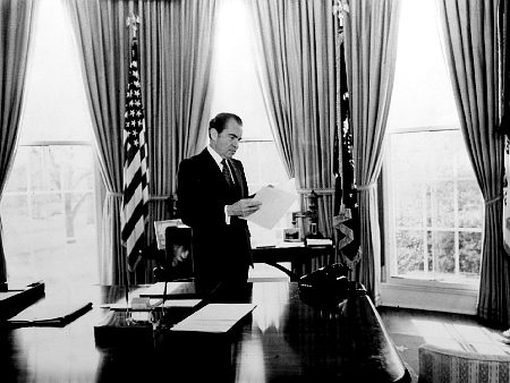Nixon resigns
On August 8, 1974, Nixon resigned from office. Vice President Gerald Ford was immediately made president the next day. He gave Nixon a full pardon but 3 of Nixon’s associates were sentenced to prison. This was the first time in U.S. history that a President had resigned from office.
As Nixon said in his resignation speech, the Watergate case and Nixon vs. The U.S. case took up a lot of the governments and the people’s time and attention. This was a very important time in American history and could not go without consequences.
A major new debate that came from this case was “Executive Privilege.” This was by far the most attention and the biggest stage that it had been brought up on. Before this, it was a small part of a government debate but not one with the American people. Everyone had their own opinion and it would now be under scrutiny with all of the Presidents after Nixon. Since then, there have still been no new amendments or laws made about it but continues to be brought up in each of the Presidency’s (although none as big as the Nixon case.)
Modern uses of "Executive Privilege"
President Bill Clinton lost in court after using “Executive Privilege” in the Monica Lewinsky scandal but he was using it as a negotiating advantage so it was not looked at as absolute privilege. Also President George W. Bush used “Executive Privilege” when documents were subpoenaed after the firings of multiple U.S. attorneys. These are only two examples of modern uses of “Executive Privilege” but are two of the most known. This shows that it has not been a key issue in our Government or in the public eye but it is still there. Until there is an amendment or law made, the Supreme Court will make the decision on whether or not the President may stand above the law or the courts in certain situations.
The Watergate scandal and the Nixon vs. U.S. was one of the biggest political scandals in the United States history. The fact that “Executive Privilege” was one of the key components of it makes it a big topic and part of our history. With that we look at our government and Presidents differently and for some, with more scrutiny.

